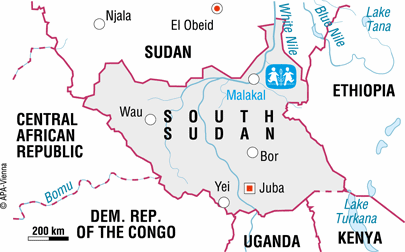Land grab becomes cross-border?
[Africa]
A fortnight ago, South Sudanese soldiers swung into yet another border dispute that resulted into grabbing of a 14 Kilometer stretch of land in Lamwo district in Northern Uganda that borders Magwir district of Eastern Equatorial province.
A Militia South Sudan in a pre dawn raid, on 4th August 2015, displaced some 10,000 people in Lukung sub-county of Lamwo district, claiming that the Uganda government had seized their land during the ongoing South Sudan civil war.
An eye witness narrative is that the marauding soldiers on the fateful day mounted an operation in several Lukung sub-county villages, forcing people to flee from their homesteads, while beating those who had refused to evacuate.
Abalo Christine 70, a resident of the affected area said the South Sudanese whom they believed to be part of SPLA, originates the from Acholi community their counterpart ethnic grouping of the Acholi of South Sudan. They have been raiding Uganda at Lukung, Ngom-romo village telling them the Sudan border line is extended up to River Limo 14 kilometers inside Uganda.
Col. Mugerewa the Deputy 5th Division Commander in the UPDF could not take this incident lying low. He has been paying personal visits in the affected areas trying to talk to the marauding South Sudanese army to leave peacefully. But the forces never yielded to UPDF commander’s demands, until they were smoked out, Col Mugerewa disclosed.
Uganda-South Sudan boarder land occupation has been a persistent flaw in forging of a long lasting good relationship between both Governments. The Northern Uganda post conflict peace failed to address the search for a durable negotiated settlement in the Acholi sub-region who bored over two decades heinous human degeneration insurgency.
South Sudan ethnic groups along Uganda-Sudan boarder have common interests that range from social, trade and commerce, security and military alliances.
Uhuru Kenyatta in his address to the Uganda parliament, said for East Africa economic security, a partnership should be achieved to ensure East Africa becomes the hub and leader in investments in the traditional markets of Europe and North America.
Thus, for the key IGAD member states to engage in banana republic border wars is senseless.
They undermine cross border and trans-national ethnic kinship, and over lapping cultural-cum linguistic religious affiliations.
Land grabbing in Acholi sub-region enjoys support by the Kampala regime. This is a result of stymied Juba peace talks, which should have ended in a win-win situation. The council of Acholi chiefs and the umbrella of Acholi Religious Peace Initiative had been observers in the Juba peace talks.
Their hope for Northern Uganda post war is a new peace proposal, that is: total reparation, re-integration of former LRA forces and reconciliation and truth telling that would solve all the hidden brawling land conflict that has cropped up.
Otto Martin, the minister of Acholi traditional chiefdom who is the official spokesperson for the chiefdom says Acholi chiefs rejected a $54 million World Bank grant request for land demarcation; the meeting took place in Gulu district Northern Uganda.
But the leaders asked that the process should be made very clear. “When was it given and why, what are the interests of the World Bank and what is in the minds of our people”, Otto questioned.
Otto wants Acholi traditional chiefdom to direct the Acholi community to go back and look at the back ground of the Uganda and World Bank policy.
That before going to IDPs camp the land was in the hand of the clans, “Nobody was allowed to tamper with the land system, and the market was not going to chopping off a piece of land and sell it,” Otto says.
Acholi sub-region has 35% of Uganda’s arable land; 16% of land is in Eastern Uganda, 25% Central Uganda and 26% of land in western Uganda.





